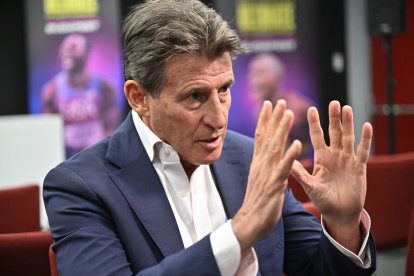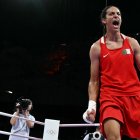Strong warning from Sebastian Coe: 'We risk losing women's sport'
The athletics legend and current president of World Athletics is aiming to lead the International Olympic Committee (IOC) and has called for a ban on transgender women from competing in women’s events.

Sebastian Coe gestures during an interview.
Sebastian Coe, the president of the International Athletics Federation (World Athletics) and Olympic legend, has warned of the potential risks to women's sports posed by the inclusion of biological men in these competitions. The former athlete, who plans to run for the presidency of the International Olympic Committee (IOC) in March, emphasized that the Olympic movement should take the lead in addressing this issue.
In an interview with AFP, Coe called for a revision of the rules governing athlete eligibility for women's competitions, particularly in light of the controversy surrounding boxing at the Paris 2024 Olympics. As the president of World Athletics, the Olympic gold medalist in the 1,500 meters at the 1984 Los Angeles Games has become a staunch advocate for banning transgender athletes from competing in women’s events.
Coe, a staunch advocate for the rights of female athletes
"I don't think you can play fast and loose with a sport like boxing. You have to have clear policies as you do across all sports," Coe said after a World Athletics event in Budapest. He further claimed that "International federations are expecting that landscape to be created by the Olympic movement. It is a co-curation, if you like, but the thought leadership and the lead that needs to be taken does have to come through the Olympic movement."
"If we do not protect women's sport and we don't have a clear and unambiguous set of policies to do that, then we run the risk of losing women's sport. From a personal perspective, and as the president of an Olympic sport, I'm just not prepared for that to happen," he said.
World Athletics already bans trans men from competing in women's competitions
Last year, World Athletics banned athletes who have gone through male puberty from competing in women’s events in the world rankings. As a result, transgender athletes are prohibited from participating in women’s track and field competitions — a decision Coe has said he does not regret.
"It was the right decision then, it's the right decision now. Those rules are here to stay, and if we have to defend them, we will defend them, and we will defend them on the basis that it is absolutely vital that we protect, that we defend, that we preserve the women's category."
IOC presidency
Coe’s next goal is to secure the presidency of the IOC, though he faces stiff competition. The pressure is growing for a woman to lead the IOC — a position never held by a female before — with former Zimbabwean swimmer Kirsty Coventry among the seven contenders. Coventry, who sits on the influential IOC executive committee, is a formidable rival. However, Coe, an IOC member since 2020, remains confident in his bid.
"We have to look at ourselves as a movement and ask ourselves whether we are making the most of the experiences and skills of colleagues who, like me, sit in sessions and congresses. I'm not sure we are doing that and I don't think we have the right structures in place to allow that in an optimal way."
Coe has made some enemies with his unwavering stance on banning Russian athletes from competition — first due to doping scandals and later in response to Moscow’s invasion of Ukraine. While the current IOC president, Thomas Bach, has been working in recent months to reintegrate Russian and Belarusian athletes into global sport under a neutral flag system, Coe has remained steadfast, upholding the ban for athletics at the Paris 2024 Olympics.
His key priorities, if elected
If elected, Coe has pledged to consult more broadly on key issues. "I want to make sure, if I do become president, that I create structures that allow the members' voice not just to be heard, but to be acted upon," he said. This would include establishing a board of directors accountable to the membership and a presidential office that maintains regular contact with stakeholders.
The next Summer Olympics will be held in Los Angeles, United States, in 2028, followed by Brisbane, Australia, in 2032. Saudi Arabia, which will host the 2034 World Cup, is also aiming to secure the Olympics as its next major event. For the 2036 Games, emerging powers such as India are expected to be strong contenders.
"We need to take our sport into regions and new territories that are going to fundamentally encourage more young people into sport," he stressed. "I don't close my eyes or my thoughts to any country in any continent wanting to stage our events. I would actively encourage that competition amongst cities who have the ambition to want to do that and whose interests align with ours... whether it is Saudi Arabia, whether it is India, whether it is anywhere in the world."













